|
|
|
Sort Order |
|
|
|
Items / Page
|
|
|
|
|
|
|
| Srl | Item |
| 1 |
ID:
022620
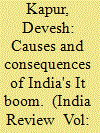

|
|
|
|
|
| Publication |
April 2002.
|
| Description |
91-110
|
| Summary/Abstract |
How did India achieve prominence and global competitiveness informational technologies (IT) when its record in other technology sectors has been lackluster? Conventional arguments emphasizing comparative advantage, export-led growth and the absence of state intervention, while important, have limited explanatory power. State policies, in particular, investments in higher education and public R&D institutions, a historical compromise on the English language, regulatory polices all played a role. In addition, the article emphasizes the positive network and reputational effects of the Indian diaspora (especially in Silicon Valley) to the development of the sector. It concludes by examining the broader consequences of this sector's success for India. An important direct effect is the likely emergence of India as a significant player in tradable services. However, the indirect effects such as legitimizing capitalism, spurring competition among Indian states, and giving the country a greater measure of self-confidence, may be more important.
|
|
|
|
|
|
|
|
|
|
|
|
|
|
|
|
| 2 |
ID:
113228
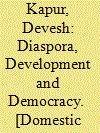

|
|
|
|
|
| Publication |
New Delhi, Oxford University Press, 2010.
|
| Description |
xv, 325p.Hbk
|
| Standard Number |
9780198070214
|
|
|
|
|
|
|
|
|
|
|
|
Copies: C:1/I:0,R:0,Q:0
Circulation
| Accession# | Call# | Current Location | Status | Policy | Location |
| 056635 | 304.80954/KAP 056635 | Main | On Shelf | General | |
|
|
|
|
| 3 |
ID:
148168
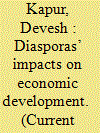

|
|
|
|
|
| Summary/Abstract |
“[S]ending countries can certainly do more, such as increase human capital investments, strengthen networks that increase the development value of diasporas, reduce barriers to return and circulation, and, above all, create an environment to attract and retain talent.”
|
|
|
|
|
|
|
|
|
|
|
|
|
|
|
|
| 4 |
ID:
091476
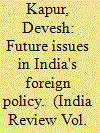

|
|
|
|
|
| Publication |
2009.
|
| Summary/Abstract |
The early decades of India's independence were characterized by a broad engagement in international affairs, with the country taking a leadership role in international organizations and regimes. This diplomatic internationalism contrasted starkly with India's autarchic economic policies, as the country became more economically insular in its first decades. The growing mismatch between India's ambitions to be a major actor in global affairs and its declining economic influence had become evident by the 1980s.
|
|
|
|
|
|
|
|
|
|
|
|
|
|
|
|
| 5 |
ID:
066420


|
|
|
|
|
| Publication |
Washington DC, Center for Global Development, 2005.
|
| Description |
xi, 246p.
|
| Standard Number |
1933286032
|
|
|
|
|
|
|
|
|
|
|
|
Copies: C:1/I:0,R:0,Q:0
Circulation
| Accession# | Call# | Current Location | Status | Policy | Location |
| 050262 | 331.12791/KAP 050262 | Main | On Shelf | General | |
|
|
|
|
| 6 |
ID:
058936
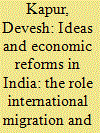

|
|
|
|
|
| Publication |
Oct 2004.
|
| Summary/Abstract |
Discussions on the economic effects of globalization focus primarily on the causes and consequences of the increased cross-border flow of capital, goods and services. This paper highlights a more subtle mechanism arising from the cross-border flow of human capital – namely, the flow of ideas. Transmitted directly by policy intellectuals who returned to India after working or studying outside India, as well by members of the Indian diaspora that have settled abroad, these ideas have influenced India’s policy framework. Many of these elites are embedded in international "epistemic communities" that have become linked to India’s policymaking process. Patterns of elite migration, combined with certain features of India’s policymaking process and institutional environment, have reshaped the economic preferences of elites, with significant consequences for the trajectory of economic reforms. This is a dynamic that is as likely to increase as to abate as the reform process continues.
|
|
|
|
|
|
|
|
|
|
|
|
|
|
|
|
| 7 |
ID:
158431
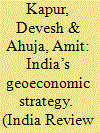

|
|
|
|
|
| Summary/Abstract |
Many observers recognize policy continuity as a prominent feature of India’s statecraft, but practitioners see fundamental changes in the last quarter century. In this article, we explain how India’s economic expansion because of sustained economic growth altered its statecraft. That prosperity is a prerequisite to sustain power has been well recognized through history by major thinkers of strategy. We examine the relationship between India’s economic strategy and its congruence with its foreign policy strategy. In particular, we illustrate how India has viewed geoeconomics, defined here as “the use of economic instruments to achieve specific geopolitical results.” We highlight the degree and instruments of India’s economic statecraft as an integral component of its foreign policy, and its strengths and limitations relative to other rising powers.
|
|
|
|
|
|
|
|
|
|
|
|
|
|
|
|
| 8 |
ID:
158427
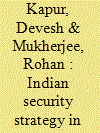

|
|
|
|
|
| Summary/Abstract |
As India assumes an increasingly salient role in world politics, questions of strategy have come to the fore in the study of Indian security. There is growing scholarly interest in Indian strategic thought and practice across a range of areas including conventional military power, nuclear weapons, maritime security, counterinsurgency, counterterrorism, and international regimes. This collection of articles expands the horizon of inquiry in some of these areas by situating Indian strategy in its historical context, by challenging conventional wisdom, and by opening new lines of research. In the following sections, we lay out the contours of what the contributors to this special issue collectively take to mean by strategy and then situate the issue in the literature on Indian strategy. We subsequently provide some over-arching observations on Indian strategy that emerge from the articles collected here and conclude by raising some questions regarding the intellectual and practical primacy of strategy in statecraft today.
|
|
|
|
|
|
|
|
|
|
|
|
|
|
|
|
| 9 |
ID:
149301
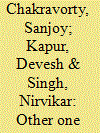

|
|
|
|
|
| Publication |
New Delhi, Oxford University Press, 2017.
|
| Description |
xxvi, 355p.hbk
|
| Standard Number |
9780199475063
|
|
|
|
|
|
|
|
|
|
|
|
Copies: C:1/I:0,R:0,Q:0
Circulation
| Accession# | Call# | Current Location | Status | Policy | Location |
| 058904 | 305.89/CHA 058904 | Main | On Shelf | General | |
|
|
|
|
| 10 |
ID:
175293
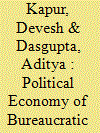

|
|
|
|
|
| Summary/Abstract |
Government programs often fail on the ground because of poor implementation by local bureaucrats. Prominent explanations for poor implementation emphasize bureaucratic rent-seeking and capture. This article documents a different pathology that we term bureaucratic overload: local bureaucrats are often heavily under-resourced relative to their responsibilities. We advance a two-step theory explaining why bureaucratic overload is detrimental to implementation as well as why politicians under-invest in local bureaucracy, emphasizing a lack of electoral incentives. Drawing on a nationwide survey of local rural development officials across India, including time-usage diaries that measure their daily behavior, we provide quantitative evidence that (i) officials with fewer resources are worse at implementing rural development programs, plausibly because they are unable to allocate enough time to managerial tasks and (ii) fewer resources are provided in administrative units where political responsibility for implementation is less clear. The findings shed light on the political economy and bureaucratic behavior underpinning weak local state capacity.
|
|
|
|
|
|
|
|
|
|
|
|
|
|
|
|
| 11 |
ID:
091480
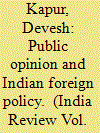

|
|
|
|
|
| Publication |
2009.
|
| Summary/Abstract |
Among the many factors that drive a country's foreign policy, the least understood is the role of public opinion. In any democracy, there is a presumption of some link, however weak and indirect, between public policy and public opinion, in so far as the latter represents voter preferences. But public opinion's links to foreign policy are more tenuous. In the Indian case there have been very few attempts to gauge public opinion on foreign policy issues, let alone to examine its effects on the country's foreign policy. This paper measures public opinion on Indian foreign policy through a survey of more than two hundred thousand households (the largest ever in India) and lays out some hypotheses on whether (and how) public opinion might effect Indian foreign policy in the future.
|
|
|
|
|
|
|
|
|
|
|
|
|
|
|
|
| 12 |
ID:
150994
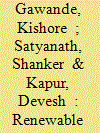

|
|
|
|
|
| Summary/Abstract |
An interesting stream of the civil conflict literature has identified an important subset of civil conflicts with disastrous consequences, that is, those that emerge as a consequence of shocks to renewable natural resources like land and water. This literature is, however, reliant on qualitative case studies when claiming a causal relationship leading from renewable resource shocks to conflict. In this article, we seek to advance the literature by drawing out the implications of a well-known formal model of the renewable resources–conflict relationship and then conducting rigorous statistical tests of its implications in the case of a serious ongoing civil conflict in India. We find that a one standard deviation decrease in our measure of renewable resources increases killings by nearly 60 percent over the long run.
|
|
|
|
|
|
|
|
|
|
|
|
|
|
|
|
| 13 |
ID:
138113
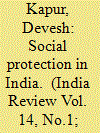

|
|
|
|
|
| Summary/Abstract |
Since the late 1990s, the Indian state has both expanded the ambit of social and economic rights for its citizens as well as launched major programmatic initiatives. Cumulatively these measures (weak as they may be) have woven safety nets for social protection and provide rudimentary underpinnings of a welfare state.
|
|
|
|
|
|
|
|
|
|
|
|
|
|
|
|
| 14 |
ID:
154546
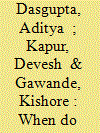

|
|
|
|
|
| Summary/Abstract |
Theory and extensive evidence connect poverty and underdevelopment to civil conflict yet evidence on the impact of development programs on violence is surprisingly mixed. To break this impasse, we exploit a within-country policy experiment to examine the conditions under which antipoverty programs reduce violence. The roll-out of India's National Rural Employment Guarantee Scheme caused a large long-run reduction in Maoist conflict violence, as measured with an original data set based on local-language press sources. These pacifying effects were not uniform, however, but overwhelmingly concentrated in districts with sufficient pre-existing local state capacity to implement the program effectively. The results demonstrate the potential for anti-poverty programs to mitigate violent civil conflict by improving livelihoods, but also highlight the crucial role of state capacity in shaping these effects.
|
|
|
|
|
|
|
|
|
|
|
|
|
|
|
|
|
|
|
|
|